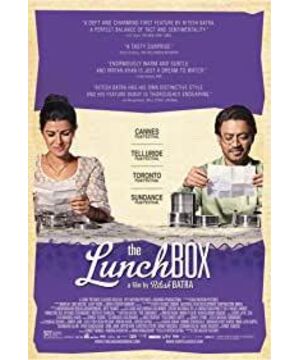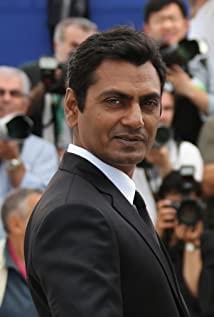in fact, they don't need to meet
because they have anguish in their hearts and can't talk about it, they will believe the person they have never met with the lunch box connection; because the current situation makes people feel helpless, they will try to propose to strangers to run away together .
Judging from the plot where they can't meet in the end (and an ending that aims to make the audience's fantasies drift away), the director doesn't want to tell a story about two strangers who exchange letters and love each other and finally fly away. Saajan felt that she was too old and should not delay other people's retirement. Even if Iina didn't wait for Saajan, she sold the gold and ran away by herself. The movie wants the audience to see the change of the protagonist himself, rather than the change of the environment and the people next to him, and the former is more important to their later life (Saajan came back later, and from the scene where he tolerated children playing football, it seems his mentality It’s also a big difference), who knew that the person on the other end of the letter would live in harmony outside the letter? (However, arranged marriages are popular in India, and most couples have never met before they get married. It may not be a risky thing to live with strangers as an Indian movie.) The first part of the letter is that the two protagonists have a faint touch. The warm flame in the bitter life is the catalyst that encourages them to take a new step in life. It is enough to have a gentle and kind confidant, a daily expectation is enough, a word of affirmation is enough, the last life It's yours, no one can save you, only you can. They don't need to find each other and then run away. The last one can't be found, one does not leave, one is no longer attached to a family where having is equal to nothing, one is no longer closed to himself, and his life has been saved by himself.
Humor
There are a lot of laughs in this movie. The type of laughs in this movie is cold and self-discovering. Saajan always has laughs in his annoying behavior before, so he can't always hate him, (more I hope that those with bad tempers in life can also show the funny place, so that others are not so uncomfortable). Watching this movie will be boring if you can't find the laughing point, but if you find it, you will feel that you are laughing from the beginning to the end, and there is no pee point in the whole movie. The real humor should probably be like this, it doesn't like to be crazy and stupid, it doesn't make a grandstanding, it's not afraid that you won't find it, it lurks in the character, it comes from a detailed action/a common word/a look of contempt. The best way to improve your laughs is to watch more comedy movies, and once you've sorted out the good and the bad, you'll start having bouts of embarrassment/cold sweats for low-level jokes, sometimes laughing out loud when the movie theater is silent.
The boring, dry, and static
films are called boring films. It is unfair. As I said before, there is no urine point in the whole process. What's the stuff like? Just after watching it, you feel that "there is no movie in this world that can bore me anymore hahaha, this is a movie that will greatly help me to train as a literary and artistic person". The main body of the Lunch box - the correspondence is generally one after another, but each letter is a selection, so the protagonist's response to this letter is also a daily selection, the heroine's doubts, full of joy and long melancholy changes On the cooking materials, the conversation with the aunt, the care of her daughter and the way of laundry, she leaned against the wall by the window when she was thinking about the whole thing, and made new dishes when she was happy (once when the male protagonist was reading a letter, she added an insert In the kitchen shot, I made the dwarf melon mentioned by the male protagonist in the morning according to the normal time sequence). The male protagonist's expectations for the daily meals, the observation of the meals during meals, and the daily interactions with the intern. He does not like to talk, but has rich eyes - the eyes are different in the scene of looking at the lunch box every day, and he is taciturn but does not know himself. There is a lot of humor in the words. There are only those few main scenes: home, office, dining hall, train, but this is a movie that expresses "change". The words of the characters, the position of the station, the way they look at things, and the actions of doing things are always changing. The location and distance are also constantly changing. Fast-food viewers who just want a change of the plot have suffered.
Dull films and dry films, the film does not want to go in either direction. And in fact, there is no need to find out, every shot is in front of you to see what you expect. Sometimes you really don't need to say anything to know what a character is thinking. Isn't life like this, how can there be so many opportunities for you to express your heart. The meaning of each of the above actions can be experienced slowly in the movie.
View more about The Lunchbox reviews











